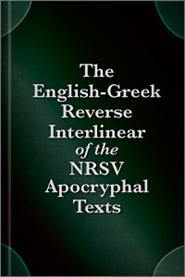 One of the challenges we’ve faced in building up Verbum into a fully functional platform for Catholic Bible study is developing support for the entire Catholic canon.
One of the challenges we’ve faced in building up Verbum into a fully functional platform for Catholic Bible study is developing support for the entire Catholic canon.
Logos’ powerful features are based on many years of building up data and code around the Scriptures, and, while the study of the Septuagint and the deuterocanonical books is not unimportant to Protestants, for obvious reasons, the smaller Protestant canon has historically been the priority for Logos’ traditional user base of (mostly) evangelical Protestants. Consequently, we’ve had some catching up to do to bring all those features to the full Catholic canon.
The recent completion of the English-Greek Reverse Interlinear of the NRSV Apocryphal Texts is another big step toward this goal. Reverse interlinears are a crucial link in Logos’ functionality, aligning the English translation with the original text so that the two become almost seamlessly interchangeable. The reverse interlinear underlies the Bible Word Study, Exegetical Guide, and other Logos features that make the original languages accessible even if you’re not an expert, and, just as importantly, they’re the crucial link that allows us to hang data on the original text and make it available through all the many various ways that text is translated.
Of course, the NRSV is a Protestant Bible (and the use of the term “Apocryphal” reflects this), but its reverse interlinears now cover the entirety of the Catholic canon (plus a few more—think of it as a bonus!). The project faced quite a number of unexpected obstacles and delays, but much of the work will carry over into the creation of full Old Testament reverse interlinears for Catholic Bibles.
We’ve still got work to do, but our continued success with Catholic products means we’ll have the resources to keep improving Verbum and building better tools for Catholic Bible study.
You can get the NRSV and its interlinears with a huge Catholic library at an incredible discount in Verbum Foundations or above. If you already own Foundations or higher, the new reverse interlinear will be automatically downloaded and added to your system.






I thought this resource was included in L4 Original Languages Library which I have? Maybe I don’t remember this correctly?
The Logos 4 Original Language Library contained only the Greek New Testament and Hebrew Old Testament reverse interlinears for the NRSV.
The Logos 4 Catholic libraries were the first packages to include this interlinear.
It’s nice to see another resource added to Verbum, but I advise everyone not to forget to keep your eyes out for little wrinkles in the Verbum/Logos product sets. For example, “Early Church Fathers Protestant Edition (37 vols.)” costs $249.95, while the Catholic edition costs $256.95. Ok, fine, I think upon seeing this, there must be something more to it that makes it worth another $7. However, there isn’t. As the Catholic edition’s descriptive text points out, “The Early Church Fathers comes in two versions, Protestant and Catholic. Simply put, the difference is that the Protestant edition contains additional front matter written at a later date. There is no difference in the actual ECF text.”
In other words, anyone who buys the Catholic edition is paying an extra $7 in order *not to get* some Protestant text. I will admit that the potential for joke-cracking here is enormous, but I also really don’t think that Logos should be charging people more for less (not that I can afford either version at either price).
Thank you for bringing this to my attention. that should not be the case. We are working to get the price fixed as soon as possible, and in the meantime I encourage you to call 877-542-7664 to get the correct price on the Catholic edition.
It’s good to see that the price of the Catholic edition has now been lowered to that of the Protestant.
Why one would choose the NRSV as an interlinear is hard to understand. Obviously, every translation is imperfect, but the RSV seems a much better choice.
Why the NRSV?
My guess: the NRSV is the basis of the Canadian Catholic Lectionary and is often cited as the translation of choice for scholars of many persuasions. I will admit to having the NRSV as my top Bible choice followed by the NAB, NJB, JPS, and NET – I’d rather have the JB than the NJB but I have to choose from what’s available.
I wish the blog had pointed out that the new interlinear also covers the Byzantine and Slavic Orthodox canons. I’d like a Google search to pick up that piece of information as a way to get the Orthodox thinking Logos when they think Bible software.
Actually, I think the NRSV made a lot of sense for Logos to use as a base text for the reverse interlinear. If I recall, it was one of the original versions to be released with a reverse interlinear, back in the Logos 3 days. I think I recall it was initially done for the NT only, but if so, the Hebrew wasn’t far behind. The NRSV is quite popular in academia – and deservedly so, despite its over-the-top capitulation to trendy gender-obsession.
Therefore, constructing the reverse interlinear for the NRSV’s Apocrypha was a no-brainer in terms of coming up with an initial text suitable for serving Catholics’ needs – the NT and Hebrew were already done; the only other translation with an Apocrypha that had RIs already constructed for NT & Heb was the KJV. I agree that the RSV (RSVCE, really) is ultimately a better base text for Catholic Bible study, and I was thrilled to see my RSVCE NT updated recently with a reverse interlinear, but as the original post suggests, this new improvement on the Logos NRSV helps pave the way for a complete RI for the RSVCE.
I am absolutely thrilled by both of these recent improvements to the Logos versions of these Biblical texts, as well as the commitment to the continuing release of important Catholic resources (e.g. the Canon Law collection that shipped today, and the full set of Apostolic Constitutions & Exhortations from JPII & BXVI released yesterday). Over about the past two years, there has been an avalanche of outstanding Catholic resources produced by Logos, such that I can’t imagine that any serious English-speaking Catholic with means wouldn’t want to adopt Logos as his study platform at this point.
Thanks to MJ and John for their excellent responses to Jeremy’s question. Per John, it’s true that the only possibility for a “full canon” reverse-interlinear in Logos/Verbum is KJV (i.e. the OT Hebrew is aligned, but not the OT Greek). NRSV seemed like the more natural and obvious choice.
In a (more) perfect world we would have a reverse-interlinear for the whole RSVCE and NABRE (and, yet more perfect, the D-R): let’s pray together for that to transpire.
Also, regarding MJ’s comment on how the new interlinear covers the Byzantine and Orthodox canon is an important one: being that this new interlinear is based on the “apocryphal” books as included in the NRSV “ecumenical” Bible, it includes books found in the Orthodox canon, namely 3-4 Maccabees, 1 Esdras and Psalm 151.
In addition to what has been said, it should also be mentioned that the project was started a few years ago, before the beginning of Logos’ current efforts to expand Catholic products, and so it didn’t have Catholics exclusively in mind. The NRSV and the ESV were the first Bibles that we created reverse interlinears for, so, in those circumstances, completing the NRSV first made sense.
If the question is why the (Protestant) NRSV was initially chosen over the (Protestant) RSV, I can’t speak with certainty, but my impression is that the RSV has not had the same staying power among Protestants that the RSVCE has had for Catholics. Most English-speaking Protestants have either adopted more recent translations (NRSV, ESV, NIV, NASB) or have stuck with the KJV. We do not have any reverse interlinears for any portion of the Protestant RSV.
For Catholic Bibles, the RSVCE is likely to be our top priority for creation of a complete Catholic Old Testament reverse interlinear as it has been for the NT. As I mentioned in the post, the work on the NRSV gives us a head start on this.